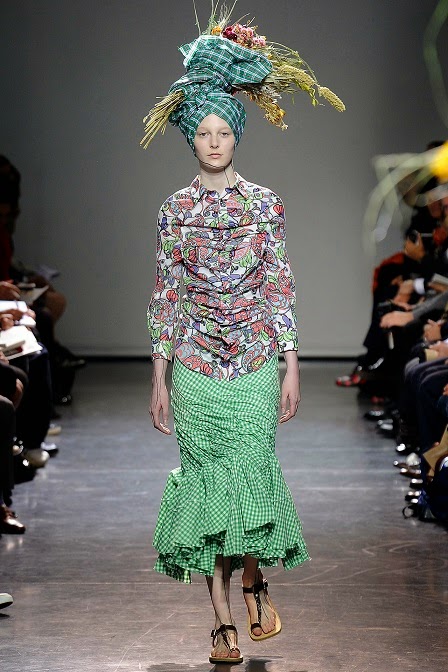Junya Watanabe folk inspired designs....
SS 2009
Junya Watanabe's spring/summer
2009 collection is visibly inspired by African folk culture as well as European
Folklore (appearing as white laced fabrics used mostly in Eastern Europe
folklore.
Girls balanced
enormous headdresses of dried flowers tied with gingham or broderie anglais swatches.
The colours mostly introduced by African prints in red, blue, and green tones.
In Junya
watanabe designs folk has a different approach, it doesn’t only appear in exact
and very direct way- very often the folk style of Watanabe is represented by
the way he is designing. His work have got very ‘organic’ look. Draping is very
common for Watanabe and seems very natural. The fabric is almost controlled
more by the gravity only slightly led by the designer. The colours used as well refer to folklore and
rustic life. The head covers seem appropriate for a rural girl in Africa as
well as European one from many years ago. Definitely agriculture had a big
influence on this collection (the headdresses designs) as well as on
traditional, African prints.
Intresing
aspect of this collection is the way Watanabe combine his outfits- using folk
fabrics(especially contrasting African prints) to design European style modern
garments. The pattern cutting of the garments and silhouette designs are the only
to make the outfits fresh and fashionable again. This collection reminds me of
works of Yinka Shonibare (http://www.yinkashonibarembe.com/) , by the inversion
of cultural aspects.
SS 2014
Dark folk of Watanabe.
The SS 2014 collection seems to
be inspired by hippie/punk approach to folk/ethnic fashion.
Vogue.uk refers ; ‘Hippies, the
American West, ravers and anything that could slip into a modern-day or apocalyptic
version of “folklore” ‘- ‘a show that was much appreciated by the designer’s
admiring fashion folk (who were all wearing autumn/winter 2013’s patchwork
jeans).’
Folklore might
have been the starting point of the collection but it slightly wandered off
into wonderful territory somehow making us feel like one moment we were in the
future and the next in the past - with layered tribal fringed dresses oh-so
casually and coolly teamed with a leather biker jacket and studded, very
studded, ankle boots.
The colour palette
seem rather settled, in natural, sandy, brown, black shades –underlining it’s
folk background. The garments have got very organic shapes, the layers of
fabric seem freely flow in the air as the models walk down the catwalk. The fringes
make the silhouettes look even more natural and less controlled. Watanabe’s
designs always seem to be half controlled- He almost allows the garments to appear
from the fabric while he manipulates it.
The styling,
especially the hairstyles, underlines the free hippie/folkie feeling of the
designs. Messy hair, appearing as a massive braid construction are accompanied
often by stunning feathers which are almost appearing as extension of models hair.
The ‘close to nature ‘aspect is again underlining the main folk/ethnic idea of
an image of modern rebel being nature minded.Tailoring split off into fringing
at its hems to make for the most sophisticated of scarecrow looks and braided
hair progressively collapsed as the show went on, ending with huge feathers
spiking out.














































